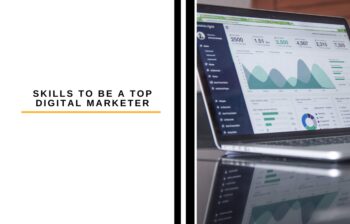While most digital marketers will focus on a specialty such as eCommerce or email marketing, it’s important to at least have a base level of understanding of all areas of digital marketing. Understanding multiple digital marketing skills will make you more valuable to a company and easier for you to advance your career.
However, with so much information available, it’s easy to get overwhelmed when trying to learn digital marketing from scratch. Even seasoned marketers can get lost navigating new tools and chasing algorithms.
Fortunately, there are a large number of resources that can help you succeed at your own pace. Plus, many digital marketing skills go hand-in-hand. For example, content marketing overlaps with email marketing, ad copy, etc.
What skills do you need to be successful in Digital Marketing?
Digital marketing is a career that requires life-long learning. You will need to be prepared for continuous research and learning new techniques, tools, and soft skills. Whether working alone or on a team, time and financial resources should be invested to see results.
Our top 10 digital marketing skills include:
- Search Engine Optimization (SEO)
- Social Media Marketing
- Email Marketing
- Content Marketing
- Data Analytics
- Graphic Design
- Paid Advertising
- Branding
- Competitive Research
- eCommerce
*Bonus Points* Soft Skills
How competent of a Digital Marketer are you?
Take our quiz to see if you are still a newbie or a sought-after guru.
For each of the skills below, award yourself the full point value if you have a clear understanding and frequent use of the skill. For example, if you have experience in email marketing (5 points), paid advertising (5 points), and communication (2 points), give yourself 12 points.
Let’s get started. Once you have read through the skills, tally up your points, and use our ranking at the end of the quiz to see how you rate. There is a maximum of 62 points.
1. Search Engine Optimization “SEO” (5 points)
SEO Marketing Skills:
- SERP (Search Engine Results Pages)
- CRO (Conversion Rate Optimization)
- Working with designers and developers
- Content strategy
- Keyword search
- Web analytics
- User experience
SEO is short for Search Engine Optimization. SEO is essential for marketing as it increases both the quantity and quality of web traffic. LinkedIn gives “digital marketing specialist” a top 10 spot in the most in-demand jobs. One of the most desired skills for a digital marketing specialist is SEO.
SEO knowledge is important in developing content strategies, keeping on budget, and working on a team with designers and developers for maximum efficiency. Specializing in SEO can earn you some of the highest rates in the field. Since SEO algorithms change frequently, you will spend significant time learning, watching trends, and A/B testing.
SEO does take time to see results, but it is important not to overlook this tool. With physical locations dwindling and online spaces experiences rapid growth, inbound marketing is one of the best ways to engage your targeted followers. To improve your inbound marketing, you need a firm foundation of SEO to grow SERP (Search Engine Results Pages) rankings.
SEO experts create content that will resonate with the desired audience by choosing relevant articles and search terms. However, content strategy is only one part of SEO. You will also need to understand how to build the framework of the webpage and how to structure each URL.
SEO work should never be done manually. Several SEO tools that can automate processes and help you understand how to improve SEO with minimal effort. Tools like Moz and Aherfs perform search volume reports regarding search terms and Google Analytics and HubSpot give light to web traffic and conversion rates.
In the future, SEO will go beyond trying to score a coveted listing on the first page of Google. Competitive sites will be focused on creating a simplified user experience (UX).
Conversion Rate Optimization
Along with SEO, Conversion Rate Optimization (CRO) After successfully implementing SEO, you can begin to add CRO to your arsenal. CRO helps your brand gain traction and improves ROI. Businesses often seek marketers to provide SEO and CRO to increase quality traffic which leads to a higher targeted audience and more sales.
SEO Courses
- Google SEO Starter Guide (Free)
- The Beginner’s Guide to SEO by Moz (Free)
- SEO: Complete SEO Training + SEO for WordPress Websites ($109.99, regularly on sale for $14.99)
2. Social Media Marketing (5 points)
Social Media Marketing Skills:
- Social media platforms, Facebook, Instagram, Twitter, LinkedIn, TikTok, Pinterest, Messaging apps
- Social scheduling tools (Buffer, Hootsuite)
- A/B testing
- Social media platform ads manager (Facebook ads)
- Design tools (Canva)
According to DigitalMarketing.org 7 out of 10 Americans use social media to communicate and share engaging information. On average, Internet users around the globe spend over 2 hours daily on social media sites.

Just like SEO, social media is constantly changing. Whether a company relies on social media to bring organic traffic or uses advertising, there is a constant learning curve for successful social media skills.
When social media was new to business marketing, companies were haphazardly posting pics and a few hashtags. Now, just as with Google, social media sites frequently change algorithms, forcing social media marketers to quickly pivot content strategies.
While social media giants Facebook and Instagram are the main players in the field, you can expect sites like LinkedIn, TikTok, and Pinterest to gain popularity. Social media marketers will need to have a “jack of all trades” attitude with skills in design, copywriting, finance (ads), and current trends.
Social media relies on constant communication so you will need to research each brand to understand their customers and what kind of content engages them. Understanding what social media platforms your business’s customers are on can help you excel on the right platforms and spend more time creating valuable content from YouTube videos to new product launches to keep your audience hungry for more.
To be successful, you will need to utilize paid social media ads and influencer marketing to meet your goals. An organized content calendar is key to posting consistently and determining what type of content is the most successful.
Social Media Courses
- Social Marketing Training – Hootsuite Academy (Free, industry-recognized certificate for a fee)
- A beginner’s guide to Instagram for business (Free)
- YouTube Marketing Course: Successful Strategies to Grow and Optimize Your YouTube Channel by HubSpot Academy (Free)
3. Email Marketing (5 points)
Email Marketing Skills
- Drip campaigns
- Email outreach
- Personalization
- Design/layout
- A/B testing
Even with the amount of time each person spends on social media every day, email is still king. Recent research by Litmus concludes that for every dollar brands invest in email marketing, they receive 42 dollars in return.
Personalizing email templates is a must. Inserting the customer’s name, segmenting your list, and scheduling drip campaigns can all lead to higher conversion rates.

Email marketing is essential for capturing new leads and providing a steady flow of orders and brand awareness.
Choosing an all-in-one email marketing solution like ActiveCampaign and Sendinblue can greatly decrease the number of software platforms you use and the amount of time it takes to create and send a campaign.
Email Marketing Courses
Email Marketing by HubSpot Academy (Free)
Digital Marketing Masterclass – 23 Courses in 1 ($139.99)
Email Marketing: Start Growing Your Own Email List Today ($94.99)
4. Content Marketing (5 points)
Content Marketing Skills:
- Strategy (time management)
- Podcasts
- Video editing (Premiere Pro)
- CMS (WordPress, HubSpot)
- Design (Photoshop, Canva)
- Keyword research (SEMrush, Ahrefs, Moz)
- Analytics (Google Analytics)
- Grammarly
Consumers are constantly bombarded with ads, whether on social media, email, or surfing the web. A great content marketer can provide 3x more leads than paid search ads. With brands competing for their customers’ attention, content marketers who can prove their worth in ROI and strategy are in high demand.
Content marketing ties in social media, email, and SEO marketing by captivating an active audience. Using SEO optimized content throughout your website will help your site rank for relevant keywords.
While blog posts are still a valid form of content marketing, you will need to step up your game. Content marketers are adding podcasts, video editing, virtual events, and testimonials to exponentially grow their audiences.
A shift in consumerism is solidifying the need for a human content marketer that can tell a story and evoke the overall mission of a company. By providing an emotional connection, brands can increase trust, authority, and purchases.
Content Marketing Courses
- Coursera’s The Strategy Of Content Marketing (Free, Course certificate for a fee)
- Udemy’s Content Marketing Masterclass: Create Content That Sells ($139.99, regularly on sale at Udemy for $19.99)
5. Data Analytics (5 points)
Data Analytics Skills
- SQL
- Analytics, Google Analytics
- Social tracking, Sprout Social
- Event tracking, Hotjar
- Interpreting data from SEO, social media, email marketing, and PPC
- Voice search
- AI
- Security
Data enthusiast is quickly becoming an in-demand role. The skillset goes beyond the daily use of Google Analytics and self-reliant digital strategies. Big data and the Internet of Things (IoT) is standard across industries, pushing marketers to use this AI data to engage customers and reduce overall marketing costs.
With a variety of automated tools available, data marketers are expected to understand each stage of the sales funnel, make adjustments when necessary, and manage multiple ROI events across platforms.
As big data increases weight in the overall marketing strategy, data marketers should invest time into learning data languages such as Structured Query Language (SQL).
Interpreting data is essential for catching revenue sources. By utilizing the data from SEO, social media, email marketing, and PPC, you can make more informed decisions that can greatly affect your marketing strategy.
Gathering and reading data can even improve user experience. Learn your customer’s product preferences and buying frequencies. Determine which emails have the best open rate or which social posts have the most interactions.
As a marketer, you don’t have to be a professional data analyst. However, it will greatly benefit your skill set to learn data foundational concepts and tools that can help you gather customer data.
Voice Search
Consumers are falling in love with voice search. They can play their favorite music, quickly access the weather, and learn fun facts without finding a keyboard to type on. Future generations are loving voice search too. Over half of teenagers currently use voice search daily.
eCommerce is reaping the benefits of voice search too. By 2022 it’s projected that shopping by voice commands will be a 40 billion dollar industry.

Adding voice to your marketing arsenal can provide consumers and potential customers with a streamlined experience across all of their devices which can make it easier to find your business, order products, and follow up.
Security
Data security analysts are in demand. In this role, the analyst protects a business’s computer systems and networks.
They monitor these systems frequently and notify businesses if any hackers or fraud is present. As cybersecurity attacks continue to increase, having this skill can be immensely valuable for companies that house large amounts of consumer data including personal and financial.
Data Analytics Courses
- Berkeley’s MicroMaster Program in Marketing Analytics ($996)
- Udemy’s The Complete SQL Bootcamp ($179.99, regularly on sale for $25.99)
- SQL – MySQL for Data Analytics and Business Intelligence ($94.99, regularly on sale for $12.99)
6. Graphic Design (5 points)
Graphic Design Skills
- Photoshop/Canva
- Web design
- Product design
- UX design
- Social media design
- Newsletter design
Graphic design skills are not required as an online marketer. However, learning basic graphic design skills can expand your business or provide an additional service for smaller companies without a graphic design team.
Learning software like Photoshop and Canva can help you create web-friendly graphics for social media posts, email newsletters, blog posts, and more.
Product/UX Design/Web
Along with big data and content marketing, user experience is one of the most profitable graphic design avenues. This type of design focuses on web pages, eCommerce, video games, and apps.
Graphic Design Courses
- HubSpot’s Graphic Design Essentials: easy Steps for Creating Your Own Compelling Visuals (Free)
- Online Graphic Design Certification Course via NYIAD (New York Institute of Art and Design) ($1,199 with online certification)
- UX Design Bootcamp, Job Guaranteed ($10,000)
7. Paid Advertising (5 points)
Paid Advertising Skills
- PPC
- CPC
- CPM
- Google ads
- Facebook ads
Paid advertising is a standard skill that most online marketers will be asked to perform. From social media ads to Google ads and PPC, paid online advertising can be beneficial after a target audience is gathered and understood.
For example, the company you are marketing might target women, ages 18-30, that live in major cities across the US. The more you can narrow down your target market, the easier it will be to gain new visitors and customers that are interested in your product.

Currently, Google and Facebook own the majority share of online ad revenue. Getting organic reach on these platforms is difficult. However, mastering paid advertising on these sites and others can help your business get seen with minimal effort compared to the research and strategy that goes into SEO.
Paid advertising is also very easy to track both in ROI and financially. Whether you are running a traffic campaign (CPC) or a brand awareness campaign (CPM), paid ad platforms all provide detailed reporting. You can also set daily and total budgets so you never run out of money unexpectedly.
Popular paid advertising platforms:
- TikTok
- YouTube
Paid Advertising Courses
- PPC 101: A Beginner’s Guide to PPC by PPC University (Free)
- ClickMinded Paid Advertising Training ($997 with certification)
8. Branding (5 points)
Branding Skills
- Connect with consumers on a visual and emotional level
- Loyalty building
- Clear messaging
Branding is not only important visually but emotionally as well. Modern consumers need a brand to speak to them, treat them well, and make them feel good.

According to Motista, Customers with an emotional relationship with a brand have a 306% higher lifetime value. They will recommend the company at a rate of 71%, which is over 20% more than the average (45%).
Once consumers identify with a brand, they begin to build loyalty and trust around it. This loyalty leads to larger sales and more repeat customers. Building loyalty has huge benefits both in higher sales and lower customer acquisition costs.
Digital marketers help develop a company’s brand and take that clear-cut message across the company’s website, social media channels, online learning (Podia link), and product packaging. Creating a marketing campaign that reflects the company’s place in the market can boost its worth, while not creating a clear message can cause the company’s stats to plummet and customers to look elsewhere for their product needs.
Branding Courses
- Brand Management: Aligning Business, Brand and Behaviour (Free)
- Branding 101: The Complete Toolkit ($49)
- Personal Branding: Crafting Your Social Media Presence (Free for 14 days, then $99 per year)
9. Competitive Research (5 points)
Competitive Research Skills
- Analytics (client and competitors)
- Segmenting audience
- Traffic
- Keywords
You might not think of yourself as an investigative reporter, but digital marketers are doing a disservice to their clients if they don’t know who the competitors are and how to beat them.
As a digital marketer, you need to frequently analyze your client’s competitors to learn their product line, sales numbers, and marketing strategies. You will also need to answer the question “Why is my client’s product the best?”

By “spying” on your competitors’ online ads, media coverage, and product launches, you can develop a content strategy that appeals to consumers on a deeper and more targeted level.
Competitor Research Courses
- Marketing Analytics: Competitive Analysis and Market Segmentation (Free, $249 online certification available)
- Strategist’s Toolkit: Competitor Analysis (Free, paid online certification available)
- Competitor Analysis with Semrush (Free)
10. eCommerce (5 points)
eCommerce Marketing Skills
- Paid online advertising
- Hi-resolution visuals
- Content that converts
- Website optimization
- Drip campaigns
- A/B testing
Consumer confidence in eCommerce soared 44% in 2020, leading to a consumer spend of over $861 billion online in the U.S. With fierce competition to turn a profit, there is a need for qualified digital marketers to increase brand awareness, keep to financial ad budgets, and hone in on the customer experience to keep consumers coming back for more.
eCommerce marketing helps bring awareness and improve a business that sells products or services online. eCommerce marketers frequently use digital content, email, social media, and search engines to increase traffic and streamline online purchases.
Since eCommerce advertising is frequently hosted on social media, eCommerce marketers will need to have a visual eye to attract potential buyers. Hi-resolution product photos should be accompanied by witty taglines that draw the consumer in. Ads should be directly linked to product pages for shoppable content that can be tracked analytically.

eCommerce marketing relies just as much on content as it does on imagery. Optimizing product pages not only improve SEO but can increase your customer base by being ADA (Americans with Disabilities Act) compliant.
Additional optimization may include blog posts, YouTube videos, guest posts, and a FAQ section sprinkled with relevant keywords.
Email marketing is essential in eCommerce marketing. You will want to get familiar with drip campaigns and A/B testing. Plus, you will be responsible for following appropriate guidelines for adding people to your email list and increasing the open rate among subscribers.
Email marketing can take many forms in the eCommerce space but a couple of the main emails to focus on including an abandoned shopping cart (to increase sales) and post-purchase follow-up (to collect reviews).
Adding software like ThriveCart can take your eCommerce site to the next level. ThriveCart can create up-sells, down-sells, and bumps. Bumps are no-brainer offers that add irresistible checkbox accessories to your checkout page. Plus, it integrates with other eCommerce software extensions like email marketing, payment processors, webinars, etc. all through Zapier.
eCommerce Courses
- Start and Scale from Foundr ($1,997)
- E-commerce Essentials: How to Start a Successful Online Business (Free 14-day trial, then $19 per month)
- Certified eCommerce Marketing Specialist by Digital Marketer ($495)
Bonus Round: Soft Skills for Digital Marketers
While technical skills may get you a digital marketer gig, soft skills are just as important. From people skills to thinking on your feet to persuasion, possessing multiple soft skills can help you keep your job and land a profitable promotion.
-
Curiosity (2 points)
Creating connections in digital marketing should be a frequent goal. Networking with people in your field, client base, and customers is imperative for reaching a greater audience.
Curiosity about the brand, the people who follow the brand, create the brand, etc. are all important actions to take when providing a digital marketing service. Curiosity allows the digital marketer to think outside the box, try new ideas, and differentiate the brand from top competitors.
-
Creativity (2 points)
Creativity can make or break a company’s competitive edge. Digital marketers must always be learning, adapting, and bringing creativity to the table not only in terms of the big picture but the day-to-day.
One of the best ways to boost your creativity is to start a new hobby or join a new organization that is out of your comfort zone and doesn’t come easy to you. For example, learning a new language or volunteering for a local charity can help you learn new skills that challenge your way of thinking and force you to make mistakes.
-
Encouragement (2 points)
Convincing people to buy a product is no easy task. Consumers are bombarded with ads when they take in the news, browse social media, and scroll through their email.
As a digital marketer, you will need to learn the art of persuasive communication. Not only to make more sales but to improve the customer service before and after the transaction. This creates trust between the brand and its customers. Creating repeat sales, higher-order totals, and referrals.
There are several ways to infuse encouragement:
- Free gift
- Compliment
- Discount
- Free trial
- Exclusivity
- VIP club
- Influencers
-
Empathy (2 points)
Without empathy, you cannot understand where your customer is coming from, their feelings, and desires. You must use empathy to put yourself in your customer’s shoes and build a marketing campaign based on solving the customer’s pain points.
Successfully invoking empathy will engage target customers to buy and feel good about the purchase from start to finish. If empathy is a difficult skill for you to master, consider these tips for becoming a more empathetic person:
Become an active listener. Before taking action, thoroughly listen to your customer and confirm their needs. Ask thoughtful questions if needed and allow the other person space to vent without criticism.
Be vulnerable. If you connect personally with the customer, don’t be afraid to share your concerns that relate to the conversation. Being vulnerable can help create a common ground and increase your empathy toward the situation.
Assumption free zone. Making assumptions about the customer or situation before they have had a chance to share the complete story is a no-no. Make sure you listen closely and are present so you can brainstorm a valid solution and ensure that the customer doesn’t shut down.
-
Adaptable (2 points)
As a digital marketer, you will need to commit to lifelong learning. Embracing new technology, new social media platforms, and customer needs.
By relating to your customers you can build long-term relationships. Send out surveys to update customer needs and wants.
Once you understand your customer, you can adapt to the target market and increase leads. Keep an open mind and you can be a team player and consistently meet changing deadlines.
-
Communication (2 points)
Even if you wouldn’t categorize yourself as an extrovert, your communication skills must always be evolving. Communication is part of your daily job and a clear tone should be carried from blog articles to newsletters.
Communication goes beyond being a good digital marketer. Practicing these skills in everyday life can help you become a better partner, coworker, manager, and more. Speaking is only half of the equation, being a good listener is just as important.
It’s Time to Tally Up Your Score…
- 20 points or less: Hello newbie. Congrats on choosing digital marketing as a profitable career path. Consider taking a few courses or securing an internship to boost your skills.
- 21-30 points: You are an experienced digital marketing professional. You enjoy the field of marketing but you still lack the experience of an expert.
- 31-40 points: You have managed to navigate your way through the digital marketing jungle. You are a well-rounded digital marketer and are using those skills to plot your next promotion.
- More than 40 points: You are a digital marketing guru. Your social life may be suffering, but your LinkedIn profile is beaming with an impressive marketing portfolio and multiple certifications. Give us a head’s up when you’ve finished your online marketing course.
FAQs
Question: Are digital marketers in demand?
Answer: LinkedIn, a popular resume and networking website, lists digital marketer as a top in-demand job. Specific desired specializations in the field are content marketing, SEO, and social media.
To choose in-demand careers, LinkedIn looks at the volume of job postings, job growth over the past 4 years, if the job can pay a livable wage, and if required skills can be learned online.
Question: What makes a good digital marketer?
Answer: A good digital marketer will be self-motivated to learn, think on his feet, take action, and test processes for continuous improvement. Digital marketers are curious, critical thinkers, and the first to collaborate.
Question: What skills are required for digital marketing?
Answer: Digital marketing is a mix of technical and soft skills. You will need to open to the continuous learning of online marketing tools, revising strategies, and expanding overall skillsets to quickly advance in a digital marketing career. Most digital marketers specialize in one or two digital marketing skills while having a foundational knowledge of all skills is preferred.
How Do You Rate as a Digital Marketer?
If you scored on the lower end of the spectrum, don’t stress. It can be overwhelming to learn all digital marketing skills at once. Try learning SEO, creating a conversion-focused paid ad, or refining a soft skill. Whether you have money to invest in online certifications or need a free starter course, we have provided course options that will get you the skills you need to succeed.
Keep in mind even if you scored well, technical and soft skills must continually be updated as a digital marketer. New trends and tools should be explored. Experimenting with your approach can lead to better results. Plus, successfully automating daily digital marketing tasks with fresh tools can help you focus more on soft skills and enjoy your career to the fullest.
This is an exciting time to be a digital marketer. The field is thriving and the number of digital marketing tools is on the rise. The time and financial investment you put into your career today will pay off tomorrow.


